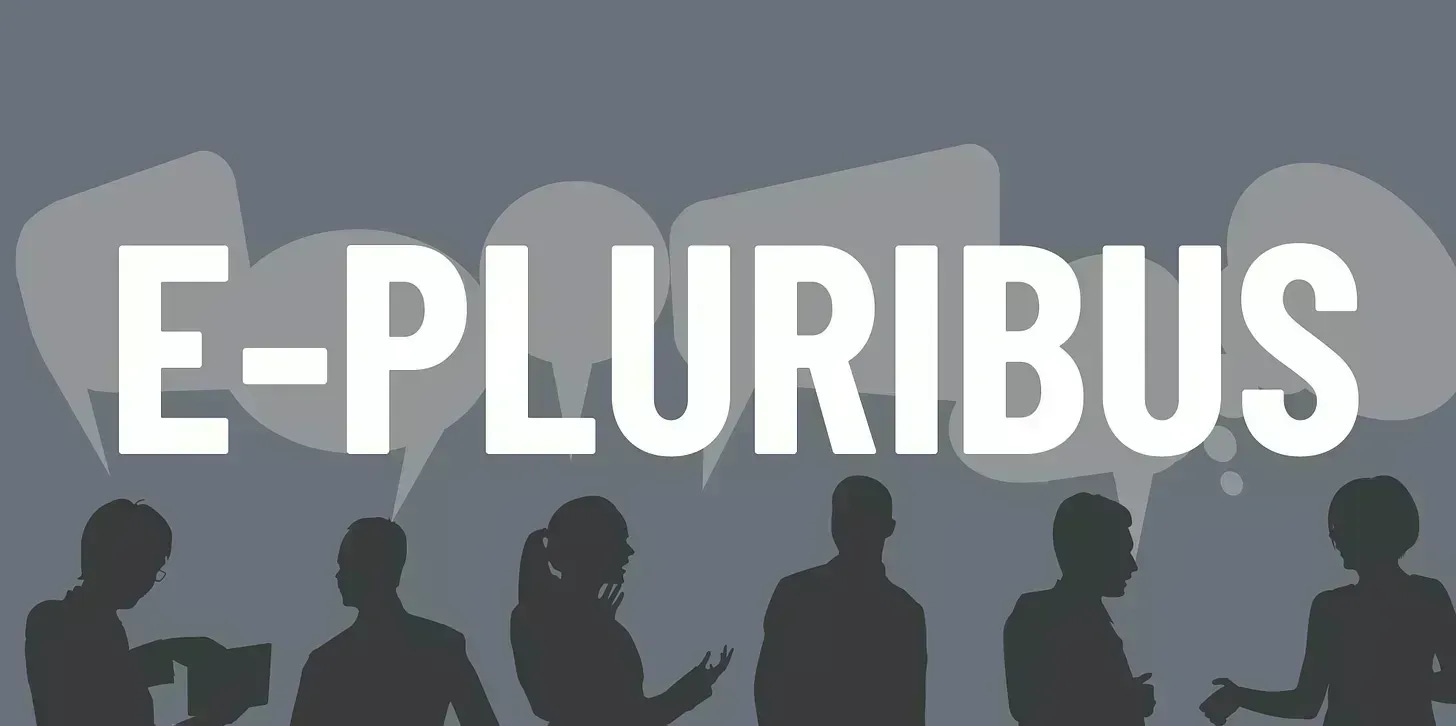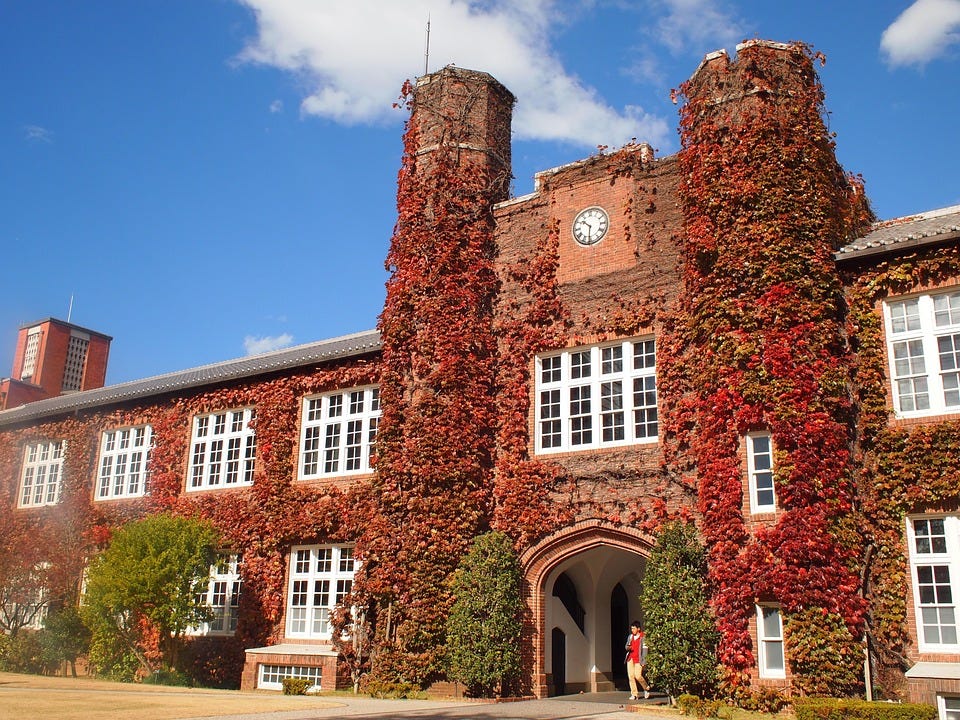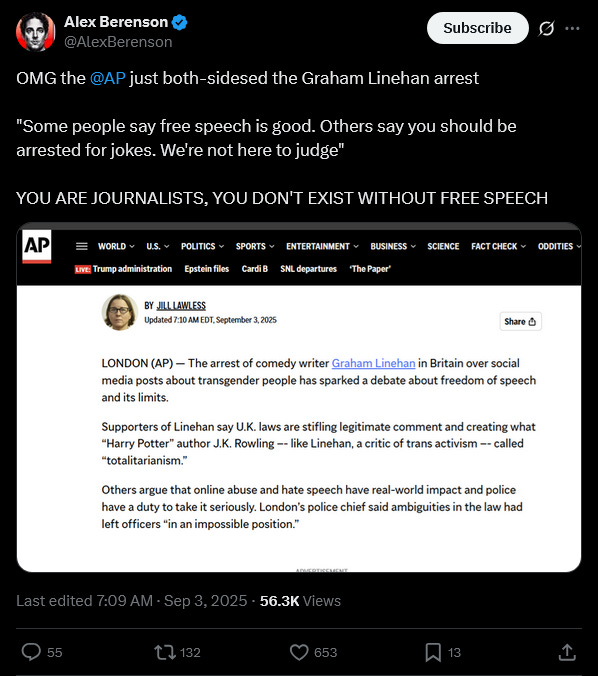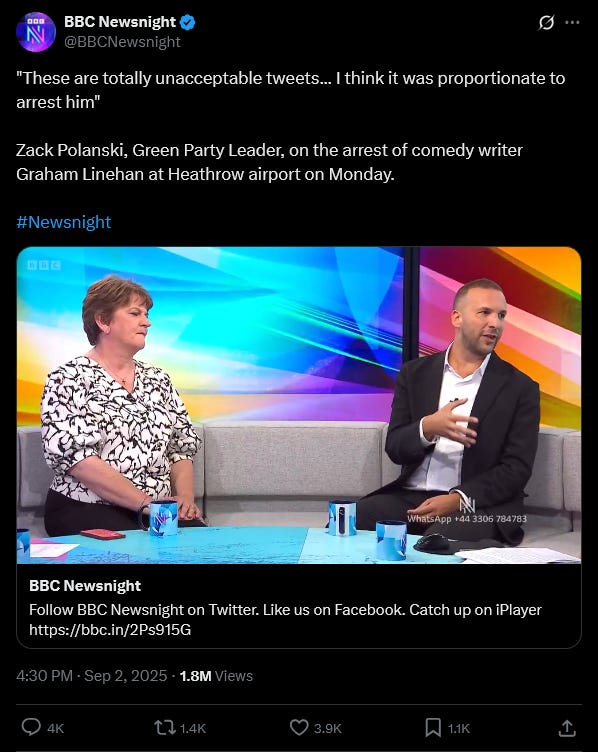E-Pluribus |September 3, 2025
'Big tent liberalism.' Universities need more reason, less speech? London police arrest writer for mean tweets.
A round-up of the latest and best insight on the rise of illiberalism in the public discourse:
Ankush Khardori: Cass Sunstein on What Lefty College Kids Get Wrong, the Dangers of Trump and His Own Regrets
Liberalism is routinely and ferociously attacked by critics on both the left and the right. In a lengthy interview with Politico, legal scholar Cass Suntein argues that liberalism is worth defending from all sides. His first push back: liberalism is also widely endorsed by conservatives and progressives who recognize the authoritarian impulses in their respective political tribes:
Liberalism is a set of commitments to freedom, pluralism, the rule of law, respect for individual autonomy, and security and self-government. Those are the ideals that liberalism represents.
Liberalism has been attractive to people on the political right. Ronald Reagan was very much a liberal. It’s been attractive to people on the political left. Franklin Delano Roosevelt was very much a liberal.
For all their disagreements, the idea of pluralism, freedom, basic individual security — those are things that unify the liberal right and the liberal left.
…
I almost called the book Big Tent Liberalism, and I have a little bit of regret that I didn’t. The publisher knows best and thought that that would be an off-putting title, but it is the case that the free market right is part of the liberal tradition, and the Great Society left, associated with Lyndon Johnson, is also part of the liberal tradition.
The disagreements between those who think the Great Society was a terrific idea and those who think it was terrible are really important disagreements, but they’re disagreements within a family.
…
I got notes from people on the political right who said, “I agree with all of this,” or “I agree with almost all of this;” people on the right who said such things as, “I’m a conservative, and because I’m a conservative, I’m a liberal. I want to conserve liberalism.”
…
I got people on the left who said there are a lot of illiberal leftists out there who are not respectful of freedom of speech and pluralism. Some of the people on the left were academics who said that universities are, in their view, flirting with illiberalism with respect to religion and speech.
…
To see the right saying, “I agree with this,” alongside people on the left — people who vote for Obama and not vote for Republican presidential candidates saying, “I embrace this” — I thought, well, maybe I should do something larger about the topic.
John O. McGinnis Universities Need More Reason—Less "Expression"
Do we actually need less free speech on college campuses? Pluribus remains skeptical of attempts to compel or silence any point of view at America’s universities, but John McGinnis at Law & Liberty claims this absolutist stance misunderstands the purpose of higher education: reasonable truth-seeking, not self-expression regardless of how absurd someone’s expression may be:
A university is an institution for finding truth by reason. But modern First Amendment doctrine is a charter for expression, protecting speech and even conduct with little, if any, rational content.
Moreover, the First Amendment protects not only speech but also assembly. That guarantee is aimed less at truth-seeking than at collective action. It empowers citizens peacefully to organize and press their government to change policy. The ideal university, by contrast, should resist any pressure unrelated to truth. An idea does not become truer because many people gather to demand its adoption. Moreover, given their role as facilitators of reasoned discourse, universities should not be adopting political or cultural positions as institutions.
…
The focus of the university on discovering truth through reason links the institution from its growth as a medieval foundation for disciplined disputation to the modern research center of today. At Bologna and Paris, the first universities, theses were stated, critiqued, and then defended by reasons. The Enlightenment sometimes redirected that method toward empirical inquiry but preserved the same architecture of truth-seeking. Conclusions were based on evidence and could be disputed based on better evidence. Modern research institutions continued this tradition and added new safeguards such as academic freedom and tenure that are designed to secure independence from faction and fashion.
The university ideal thus has remained that of a social technology for the discovery of knowledge. Sadly, the ideal is not always honored. Ideological monocultures can dull reason’s blade. But when challenged politically, at least, universities never tire of aligning themselves with their proud tradition of preserving epistemic openness bound by reason. It remains their best argument for independence from the threats of politics.
The free speech regime at the time of the Framing likely better comports with that university ideal because speech had to be an exercise in reasoned persuasion to gain protection. The point appears beneath the surface of state charters: Pennsylvania in 1790 guaranteed “the free communication of thoughts and opinions” and allowed citizens to “freely speak, write and print on any subject,” while making them “responsible for the abuse of that liberty.” That text both ties speech to the exchange of reasons and appears to draw a line at non-communicative abuse.
Johnson’s influential eighteenth-century dictionary defined “speech” as “the power of expressing thoughts by vocal words,” thus framing it as an instrument of rational expression. Jefferson stated in the Virginia Statute for Religious Freedom that citizens are “free to profess, and by argument to maintain, their opinion in matters of religion”—again, the vocabulary of argument and persuasion rather than brute verbal force. Consistent with this view, states maintained and enacted laws punishing profane cursing, blasphemy, and kindred offenses in the 1790s and early republic—Massachusetts’s “Act to Prevent Profane Cursing and Swearing” in 1798 is one example. Thus, at the time of the Framing speech was prized, but as an instrument in the service of reason. When speech departed from reasoned persuasion, it lost its protection.
Jill Lawless: TV writer Graham Linehan’s arrest over posts on X sparks debate over free speech and its limits
After his flight landed at Heathrow airport in London this week, TV writer Graham Linehan was arrested by five armed police officers. What offense necessitated such a show of force? Drug smuggling, perhaps murder? Nope—just mean tweets. The AP reports:
Linehan, the co-creator of beloved 1990s sitcom “Father Ted” and other shows including “The IT Crowd,” says he was detained by five armed police officers on Monday at Heathrow Airport as he returned from Arizona.
Linehan, who has been outspoken in his assertions that trans women are men, said on X in April that trans women were violent criminals if they used women-only facilities. He advocated people “punch” them if calling police and other measures failed to stop them.
The post came days after the head of the U.K’s Equality and Human Rights Commission said transgender women would be excluded from women-only spaces such as toilets, single-sex hospital wards and sports teams. The decision followed a ruling by Britain’s highest court that the terms “woman” and “man” refer to biological sex for antidiscrimination purposes.
…
Supporters of Linehan condemned his arrest, saying it amounted to the policing of opinion.
“This is totalitarianism. Utterly deplorable,” Rowling wrote on X.
The tabloid Sun said there was “outrage” at the arrest of the “Father Ted genius.” The right-leaning Daily Mail asked “When did Britain become North Korea?”
Kemi Badenoch, leader of the opposition Conservative Party, said: “It’s time this government told the police their job is to protect the public, not monitor social media for hurty words.”
But Zack Polanski, leader of the Green Party, said the posts were “totally unacceptable” and the arrest seemed “proportionate.”
Around X
Reactions to Linehan’s arrest have been intense, to say the least. Former New York Times scribe Alex Berenson blasted the press for presenting “both sides” of the debate—apparently forgetting that their jobs exist because of free speech:
Oddly, UK Green Party official Zack Polanski wasn’t offended so much by the arrest as the number of cops who showed up at the airport (click for video):
Finally, comedian Ricky Gervais with a perennially helpful reminder:









